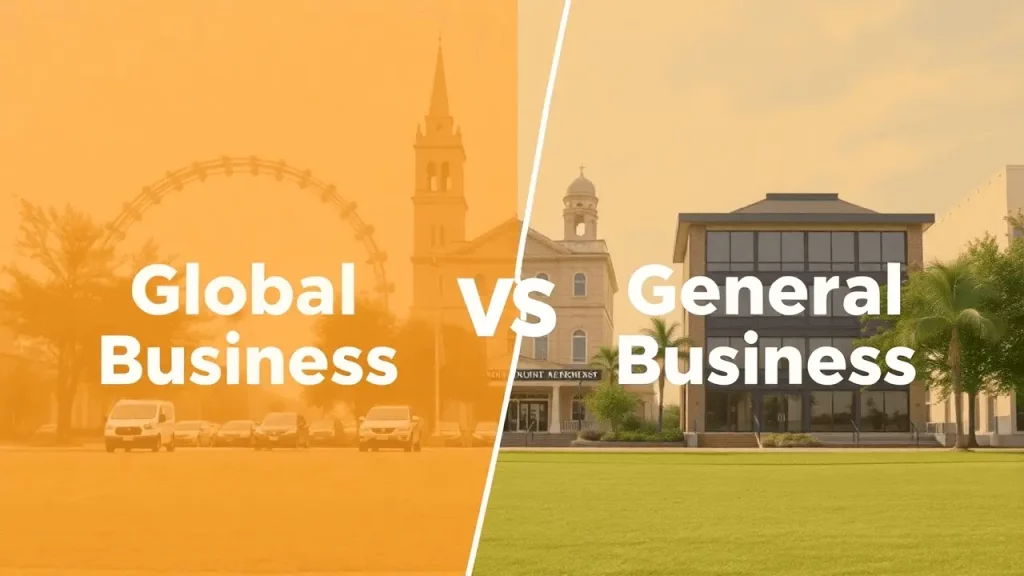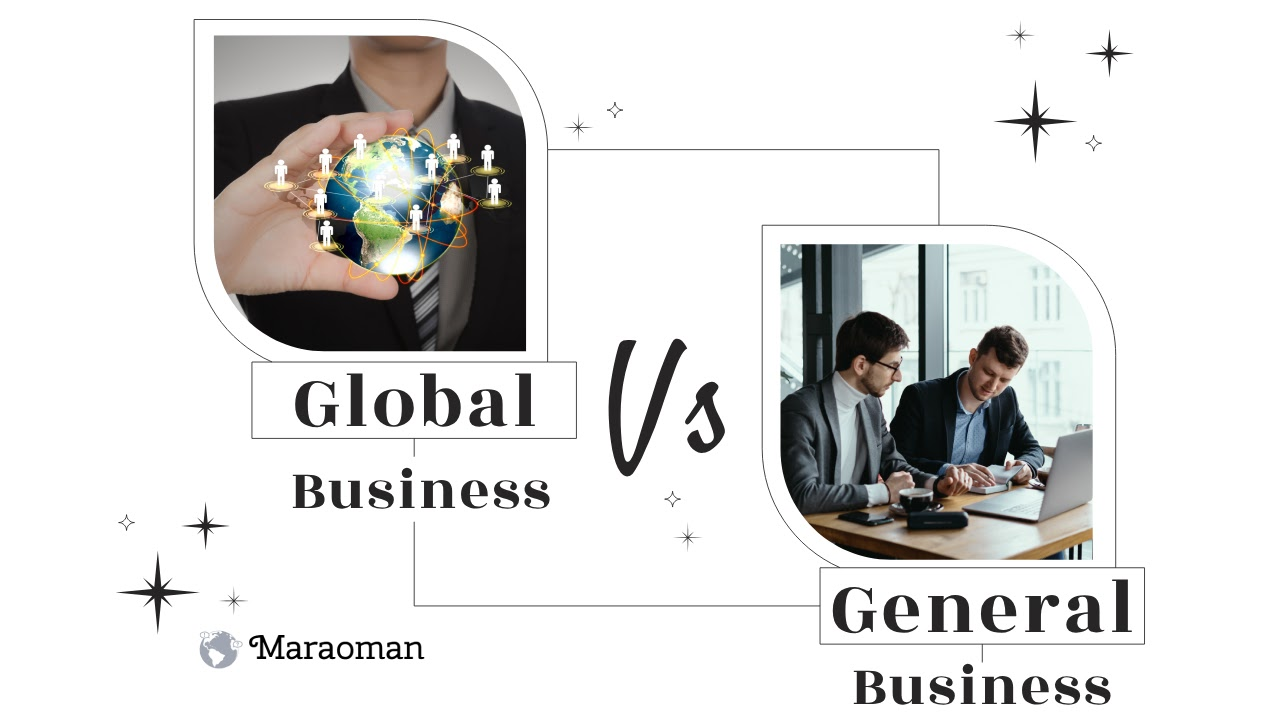Global Business vs General Business: Understanding the Key Differences
In today’s interconnected economy, businesses operate on different scales, catering to local, national, and international markets. When discussing global business vs general business, it’s essential to understand their key differences, scopes, challenges, and career opportunities. Whether you are a student choosing a degree path or an entrepreneur deciding on your business model, distinguishing between these two fields is crucial. While general business focuses on local or national markets, global business extends its operations across multiple countries, facing unique opportunities and challenges. This article will provide a comprehensive comparison to help you navigate these two distinct business landscapes.
Key Highlights
- General business operates within local or national markets, while global business spans multiple countries, navigating diverse regulations and cultures.
- General business faces moderate operational complexity, focusing on domestic laws and consumer behavior, whereas global business deals with high complexity due to international trade regulations.
- Career opportunities in general business are more stable and focused on national firms, while global business offers diverse roles in multinational corporations with growth across global markets.
- Technology in general business relies on standard tools, while global business incorporates advanced technologies like AI, blockchain, and global supply chain management systems.

What is General Business?
Definition and Scope
General business refers to standard business practices that focus on local or national markets. Companies in this category operate within a defined region, following domestic regulations, consumer behavior, and market trends. These businesses serve local demands without venturing into international markets. They focus on efficient resource management, customer satisfaction, and sustainability within a limited geographical boundary.
Core Aspects of General Business
- Domestic Market Focus: General businesses cater to a specific country or region, ensuring compliance with local regulations. This allows them to align their operations closely with national consumer needs and market trends.
- Limited Global Influence: Unlike global businesses, these companies do not engage heavily in international trade or expansion. They mainly operate within a controlled environment that has fewer economic uncertainties.
- Operational Simplicity: They face fewer complexities related to foreign trade policies, tariffs, and cultural differences. Local businesses can respond quickly to changes in customer preferences and market conditions.
- Cost-Effective Operations: Businesses operating locally avoid international shipping costs, currency exchange fluctuations, and cross-border taxation. They benefit from stable pricing strategies and minimal global financial risks.
- Career Opportunities: Jobs in general business include management, marketing, finance, and human resources within national corporations. Employees often have well-defined career paths and predictable job markets.
- Customer Engagement: General businesses have an easier time building relationships with their customer base due to shared language, culture, and economic conditions. Direct engagement helps businesses retain customer loyalty and sustain market reputation.
- Access to Local Funding: Small and medium-sized businesses (SMEs) benefit from government grants, local bank loans, and regional investment programs. The financial support helps in stabilizing operations without relying on global investment sources.

What is Global Business?
Definition and Scope
Global business, on the other hand, involves commercial activities that span multiple countries. Companies in this category expand their operations beyond domestic borders, dealing with different legal frameworks, currencies, and cultural environments. These companies must be flexible and adaptive to various international trade regulations and economic fluctuations.
Core Aspects of Global Business
- International Market Presence: Companies operate in multiple countries, dealing with various market demands. This allows businesses to tap into new revenue streams, diversify their income sources, and increase brand recognition worldwide.
- Complex Regulatory Requirements: Businesses must comply with international trade laws, tariffs, and labor regulations. Each country has different compliance laws, making it challenging for businesses to operate smoothly across borders.
- Cultural and Economic Adaptation: Understanding consumer behavior across different regions is crucial for success. Global businesses invest in market research to analyze cultural preferences, customer expectations, and purchasing behaviors.
- Technological Integration: Global businesses often invest in advanced logistics, data analytics, and AI-driven solutions to optimize international operations. These technological advancements help streamline supply chains, reduce costs, and enhance efficiency.
- Diverse Career Prospects: Careers in global business include international marketing, supply chain management, trade compliance, and global finance. Professionals in these fields often require multilingual skills, cross-cultural knowledge, and international business expertise.
- Competitive Advantage: Companies that operate globally often benefit from economies of scale, lower production costs, and access to a broader talent pool. They can outsource labor and raw materials from cost-effective locations while maintaining product quality and brand image.
- Market Expansion Opportunities: Businesses can expand into emerging markets, creating new opportunities for growth and profitability. Expansion strategies include joint ventures, strategic alliances, and foreign direct investments.
- Currency and Financial Management: Global businesses must manage currency exchange risks, international banking regulations, and foreign investment policies. Advanced financial strategies help businesses hedge against economic uncertainties and maintain stable profit margins.

Key Differences Between Global Business vs General Business
| Feature | General Business | Global Business |
|---|---|---|
| Market Focus | Local/National | International/Global |
| Regulatory Compliance | Domestic laws | Multi-country regulations |
| Complexity | Moderate | High due to multiple markets |
| Risk Factors | Lower risk due to local operations | Higher risks including currency fluctuations, trade barriers |
| Career Options | National firms | Multinational corporations, global trade |
| Cost Management | Stable operational costs | Unstable due to tariffs, taxes, and global economic shifts |
| Technology Usage | Standard business tools | Advanced logistics, fintech solutions, AI-driven strategies |
| Growth Potential | Limited to domestic expansion | Can expand across multiple continents |
| Supply Chain Management | Simple, localized supply chains | Complex, global supply chain networks |

Educational Paths for Global Business vs General Business
Choosing the right educational path depends on career goals and interests. Many universities offer degrees focusing on global business vs general business, equipping students with different skill sets.
General Business Degree
- Covers management, finance, marketing, and entrepreneurship.
- Prepares students for careers in domestic firms.
- Best for those who want to work in national companies or start a business within their country.
- Offers stability and lower exposure to external economic crises.
- Focuses on leadership, strategic planning, and business operations within a regional market.
- This degree is rooted in general education, emphasizing local market dynamics and national business practices.
- Many professionals in general business roles follow a business casual dress code, balancing professionalism with comfort in corporate settings.
This degree is rooted in general education, emphasizing local market dynamics and national business practices.
Global Business Degree
- Focuses on international trade, cross-cultural management, and global economics.
- Prepares students for multinational corporations and international markets.
- Suitable for those interested in careers that involve working across borders.
- Requires an understanding of global markets, currency exchange, and international legal systems.
- Includes case studies on successful multinational corporations and their market entry strategies.
This path is an example of global education, providing knowledge suited for navigating the complexities of global business operations.
The Role of Technology in Global Business vs General Business
- E-Commerce and Digital Platforms: Ecom global businesses leverage online marketplaces, whereas general businesses often rely on physical locations and local marketing. Digital transformation enables international companies to reach consumers worldwide through online sales and digital advertising.
- Supply Chain Innovation: Global businesses use blockchain and AI to manage complex logistics, while general businesses typically operate within simpler supply networks. Real-time tracking and automated inventory management are crucial for multinational companies.
- Financial Management: Currency exchange, global tax compliance, and international banking solutions are crucial for global businesses, whereas general businesses mainly deal with domestic financial regulations. Companies use AI-powered financial models to predict foreign exchange trends and optimize cash flow.
- Remote Work and Virtual Collaboration: With globalization, companies now use digital tools for remote work, allowing businesses to operate across time zones and geographies. Cloud computing, virtual meetings, and project management tools enhance cross-border collaboration.
- Artificial Intelligence (AI) and Automation: AI-driven analytics help companies understand consumer behavior, automate business processes, and personalize customer experiences on a global scale.
- Cybersecurity Measures: As businesses expand online, global companies invest heavily in cybersecurity infrastructure to prevent cyber threats, data breaches, and hacking attempts.
Real-World Examples of Global Business vs General Business
General business example
A small coffee shop chain operating within a single country follows a sole proprietorship business or partnership model, focusing on domestic sourcing, national supply chains, and local marketing strategies. Their growth potential is limited to national expansion. They do not engage in international partnerships or global distribution networks.
Global business example
A multinational coffee brand sources beans from multiple countries, sells products worldwide, and deals with international trade regulations. It must manage currency fluctuations, cross-cultural marketing, and global logistics. The brand also faces challenges such as local consumer preferences, country-specific advertising regulations, and competitive pricing in international markets.
Example of a Transition from General to Global Business
A fashion retailer that initially sells its products in a single country may expand globally by setting up e-commerce platforms, partnering with international manufacturers, and establishing overseas distribution centers. As the company enters foreign markets, it faces new challenges such as compliance with import/export laws, cultural preferences, and international shipping logistics.
FAQ’s
What is the main difference between Global Business vs General Business?
General Business operates within a local or national market, following domestic regulations, while Global Business expands internationally, dealing with multiple countries’ laws, currencies, and cultures.
What qualifies as a global business?
A global business is a company that operates in multiple countries, engaging in international trade, cross-border marketing, and multinational supply chain management. It must comply with diverse regulations, adapt to various consumer behaviors, and manage financial risks associated with currency exchange.
Is earning a global business degree a good investment?
A global business degree is valuable for those seeking careers in multinational corporations, international trade, and global markets. It offers diverse career opportunities, higher earning potential, and skills that are increasingly relevant in today’s interconnected economy.
How does general business differ from standard business?
General business refers to business practices within a specific domestic market, while standard business is a broader term encompassing all types of commercial activities, including local, national, and global operations.
What sets a local business apart from a global business?
A local business caters to a specific community or region, relying on local supply chains and customer bases. In contrast, a global business serves multiple international markets, navigating different economic conditions, cultural expectations, and regulatory requirements.
How does global business compare to business administration?
Global business focuses on international markets, trade policies, and cross-border operations, while business administration covers general management principles, finance, and organizational leadership without a primary emphasis on global operations.
What challenges do companies face in Global Business vs General Business?
General Business deals with local competition and domestic regulations, whereas Global Business faces trade barriers, currency fluctuations, cultural differences, and international compliance requirements.
What distinguishes a global MBA from a general MBA?
A global MBA focuses on international markets, cross-cultural management, and multinational business strategies, while a general MBA covers fundamental business principles applicable to national and regional organizations.
What does a global business degree cover?
A global business degree includes topics such as international trade, global supply chain management, cross-border finance, cultural adaptation in business, and multinational marketing strategies.
Which business major has the highest earning potential?
Fields such as finance, investment banking, international business, and global supply chain management often lead to the highest-paying jobs in the business sector.
What are the advantages of engaging in global business?
Global business offers benefits such as expanded market opportunities, diversified revenue streams, access to cost-effective resources, competitive advantages through economies of scale, and increased brand recognition worldwide.
Share this content:















Post Comment